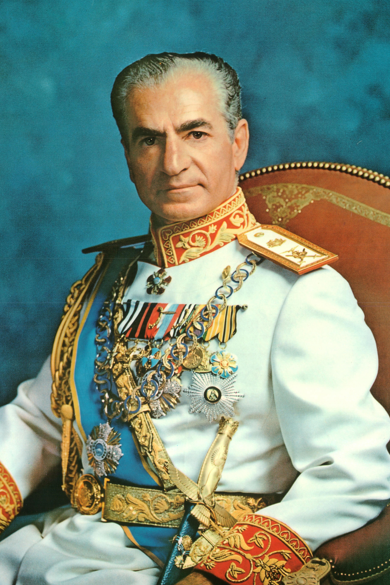o swej ostatniej żonie Farah Dibie.
Źródło: Jean des Cars, Reza II, ostatni szach w: Ostatnie dni dyktatorów, op. cit., s. 139.
Mohammad Reza Pahlawi słynne cytaty
„Chcę tę właśnie. Wiem, że ona jest dla mnie odpowiednia.”
do swojej matki Tadż ol-Moluk, która pokazała mu podczas herbatki zdjęcia różnych kobiet; Pahlawi wybrał Sorajję Esfandijari Bachtijari.
Źródło: Ulrike Grunewald, Słynne rywalki, czyli gra o miłość, pieniądze i władzę, tłum. Roman Niedballa, wyd. Videograf II, Katowice 2009, ISBN 9788371836824, s. 107.
audycja radiowa z 14 marca 1958, przed którą rozstał się z żoną Sorajją Esfandijari Bachtijari.
Źródło: Erich Schaake, Kobiety dyktatorów, tłum. Roman Niedballa, wyd. Videograf II, Katowice 2004, s. 106.
w wywiadzie udzielonym Orianie Fallaci w październiku 1973 w Teheranie.
Źródło: Oriana Fallaci, Wywiad z historią, op. cit., s. 438.
w wywiadzie dla brytyjskiego „Guardiana” latem 1972.
Źródło: Kazimierz Kozub, Politycy z pierwszych stron gazet, wyd. Iskry, Warszawa 1976, s. 307.
Źródło: Erich Schaake, Kobiety dyktatorów, op. cit., s. 91.
gdy Oriana Fallaci spytała, czy może zapalić papierosa.
Źródło: Oriana Fallaci, Wywiad z historią, op. cit., s. 429.
„Nieświęty związek czerwonego i czarnego.”
o opozycji przeciwko jego rządom złożonej z islamistów i komunistów.
Źródło: Jean des Cars, Reza II, ostatni szach w: Ostatnie dni dyktatorów, op. cit., s. 141.
słowa na łożu śmierci skierowane do swego syna.
Źródło: Jean des Cars, Reza II, ostatni szach w: Ostatnie dni dyktatorów, tłum. Anna Maria Nowak, wyd. Znak Horyzont, Kraków 2014, s. 143.
Mohammad Reza Pahlawi Cytaty o historii
w wywiadzie udzielonym Orianie Fallaci w październiku 1973 w Teheranie.
Źródło: Oriana Fallaci, Wywiad z historią, op. cit., s. 441.
Źródło: Oriana Fallaci, Wywiad z historią, tłum. Agnieszka Czepnik, Anna Osmólska-Mętrak, Joanna Ugniewska, wyd. Sfery, Warszawa 2012, ISBN 9788377990391, s. 431.
w wywiadzie udzielonym Orianie Fallaci w październiku 1973 w Teheranie.
Źródło: Oriana Fallaci, Wywiad z historią, op. cit., s. 433.
w wywiadzie udzielonym Orianie Fallaci w październiku 1973 w Teheranie.
Źródło: Oriana Fallaci, Wywiad z historią, op. cit., s. 453.
w wywiadzie udzielonym Orianie Fallaci w październiku 1973 w Teheranie.
Źródło: Oriana Fallaci, Wywiad z historią, op. cit., s. 438.
Mohammad Reza Pahlawi: Cytaty po angielsku
Page 146-147
Publications, The Shah's Story (1980), On world leaders and statesmen
Page 205
Publications, The Shah's Story (1980), On Islam and the Islamic Revolution
As quoted in Gérard de Villiers (1975), The Imperial Shah: An Informal Biography, page 273
Attributed
As quoted in Marvin Zonis (1991), Majestic Failure: The Fall of the Shah, page 65
Attributed
“Let the dog bark; the moon shall beam on.”
As quoted in Gholam R. Afkhami (2009) The life and times of the Shah, page 261
The 'dog' was a reference to Khomeini
Attributed
Oriana Fallaci (December 30, 1973), The Mystically Divine Shah of Iran (interview), Chicago Tribune
Interviews
As quoted in Ashraf Pahlavi (1980), Faces in a Mirror, page 41
Stated to his twin sister during the Anglo-Soviet invasion of Iran
Attributed
As quoted in Marvin Zonis (1991), Majestic Failure: The Fall of the Shah, page 75
Attributed
Page 16
Publications, The White Revolution (1966)
As quoted in Asadollah Alam (1991), The Shah and I: The Confidential Diary of Iran's Royal Court, 1968-77, page 490
Attributed
As quoted in Farah Pahlavi (2004) An Enduring Love: My Life with the Shah, page 11
Attributed
As quoted in Asadollah Alam (1991), The Shah and I: The Confidential Diary of Iran's Royal Court, 1968-77, page 202
Attributed
As quoted in Gérard de Villiers (1975), The Imperial Shah: An Informal Biography, page 284
The twenty-five hundreth anniversary celebrations of Persian monarchy, taking place on October 12–16, 1971, were estimated to cost 100 million dollars.
Attributed
Page 147
Publications, The Shah's Story (1980), On world leaders and statesmen
David Frost (January 1980), The Shah Speaks http://www.youtube.com/watch?v=iKUQUDf5IBo&feature=related (video)
Interviews
As quoted in Asadollah Alam (1991), The Shah and I: The Confidential Diary of Iran's Royal Court, 1968-77, page 535
Attributed
Oriana Fallaci (December 30, 1973), The Mystically Divine Shah of Iran (interview), Chicago Tribune
Interviews
As quoted in Marvin Zonis (1991), Majestic Failure: The Fall of the Shah, page 109
Attributed
Page 146
Publications, The Shah's Story (1980), On world leaders and statesmen
Page 52-53
Publications, The Shah's Story (1980), On world leaders and statesmen
Page 142
Publications, The Shah's Story (1980), On world leaders and statesmen
As quoted in Asadollah Alam (1991), The Shah and I: The Confidential Diary of Iran's Royal Court, 1968-77, page 262
Attributed
Page 109
Publications, Mission for my Country (1961)
As quoted in Gérard de Villiers (1975), The Imperial Shah: An Informal Biography, page 259
Attributed
As quoted in Jimmy Carter (1995), Keeping faith: memoirs of a president, page 445
Attributed
Page 235
Publications, Mission for my Country (1961)
As quoted in Asadollah Alam (1991), The Shah and I: The Confidential Diary of Iran's Royal Court, 1968-77, page 65
Attributed
As quoted in Gholam R. Afkhami (2009) The life and times of the Shah, page 591
Attributed
Broadcast to the nation. November 5
Speeches, 1978
Page 182
Publications, The Shah's Story (1980), On himself
